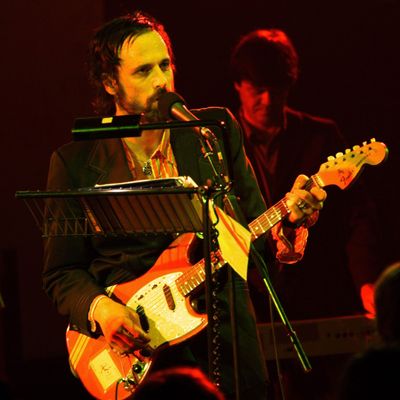
History hasn’t known too many Jewish cowboys, but David Berman was one of them. He crooned with a drawl and a twang, strumming a mere handful of chords in varying order, at once celebrating and mourning all that America had to offer. His verses, whether on the pages of his 1999 poetry collection Actual Air or in the grooves of his half-dozen-ish records, resonated because they were understated — here was a real poet, in possession of enormous verbal talent, who had no interest in showing off.
As of now, we don’t know the cause of David Berman’s death this week, and it would be inappropriate to speculate. But we may suspect that he was in pain. The Virginia-born Berman, 52, was one of his generation’s greatest singer-songwriters, best known as leader of iconic indie band the Silver Jews. They began recording in the late 1980s, earned a certain degree of fame during the indie-rock boom of the mid-1990s, and recorded new albums periodically for the next decade. The fact that they didn’t play as a live act in that whole span only added to their mystique and, eventually, made Berman’s decision to actually tour in the mid-aughts a miracle to his fans. He disbanded the Silver Jews a decade ago, but returned to the studio recently as the front man of a new band, Purple Mountains. Their first and final album was released just a few weeks ago. In retrospect, many of the LP’s lyrics are near agonizing to listen to. Take the bluntly titled “All My Happiness Is Gone”:
Mounting mileage on the dash
Double darkness falling fast
I keep stressing, pressing on
Way deep down at some substratum
Feels like something really wrong has happened
And I confess I’m barely hanging on
All my happiness is gone
All my happiness is gone
It’s all gone somewhere beyond
All my happiness is gone
Or “That’s Just the Way That I Feel”:
Well, I don’t like talkin’ to myself
But someone’s gotta say it, hell
I mean, things have not been going well
This time I think I finally fucked myself
You see, the life I live is sickening
I spent a decade playing chicken with oblivion
Day to day, I’m neck and neck with giving in
I’m the same old wreck I’ve always been
These were words that were unusually straightforward for Berman. As he put it in a recent interview, “I don’t have time for language poetry anymore. I don’t want to throw people off anymore. I don’t want to bullshit. I want to mean.” He initially meant so much to his listeners — never a massive group, but a fiercely dedicated and musically evangelical one — because he articulated what it meant to look for light in the darkness. But he tended to wrap his honesty in gentle abstraction and oblique narrative. He opened his masterpiece album, 1998’s American Water by singing, “In 1984, I was hospitalized for approaching perfection.” On his first album, Starlite Walker, he wrote, “In 27 years / I’ve drunk 50,000 beers / And they just washed against me / Like the sea into a pier.” You knew what that meant: This was a guy who struggled with the question of whether life was worth living.
Sure enough, in 2003, he downed so much booze, Xanax, and crack, he came near to death. Thankfully for both him and those who loved him, he survived. And not only did he survive, for a time, he seemed to thrive. “The Silver Jews” was initially a slightly sarcastic name, given that Berman had been entirely secular. But after his near-death experience, he connected with his heritage and religion. Though he never became strictly observant, he came to find strength in Judaism.
Berman’s all-too-brief period of catharsis and faith was chronicled in the form of a 2007 documentary directed by Michael Tully called Silver Jew. The film documents a stretch of that first Silver Jews tour, in which Berman and his cohort touched down in Israel, where they delivered invigorating performances to adoring (if moderately sized) crowds. But the musical portions aren’t what makes the documentary so revelatory, or what made us love David Berman. For that insight, you have to wait until the end.
About nine minutes before Silver Jew concludes, we see Berman arrive at the Kotel — also known as the Western Wall — in the Old City of Jerusalem, a site considered profoundly holy by virtue of having been part of the fallen Second Temple where the ancient Jews worshipped. Jews of all denominations and backgrounds flock to the Kotel from around the world to pray and contemplate, and Berman was drawn to it. He walks toward it in casual dress — a button-down T-shirt, jeans, a baseball cap — and is approached by an ultra-Orthodox Jew who invites him to pray. The anonymous man wraps the ritual straps known as tefillin around Berman’s left arm and head, then hands him a piece of paper containing one of the most essential prayers in the Jewish religion, the Shema. Berman tells the man he can’t read Hebrew. No worries, the man says — just read the English translation.
Berman holds the paper, bows his head, and starts to read: “You shall love the Lord your God with all your heart, with all your soul, and with all your might.” As he gets to the lines, “I will give rain for your land at the proper time, the early rain and the late rain,” his voice starts to break. His hand trembles. “Take care, lest your heart be lured away, and you turn astray,” he continues. Now he is weeping. He completes the prayer and gasps for air as the ultra-Orthodox man unwraps the tefillin and another one comforts him. He starts to laugh. You know he has felt something. He has known joy. As the Jews, be they silver or not, say: zikhrono livrakha — may his memory be a blessing.

